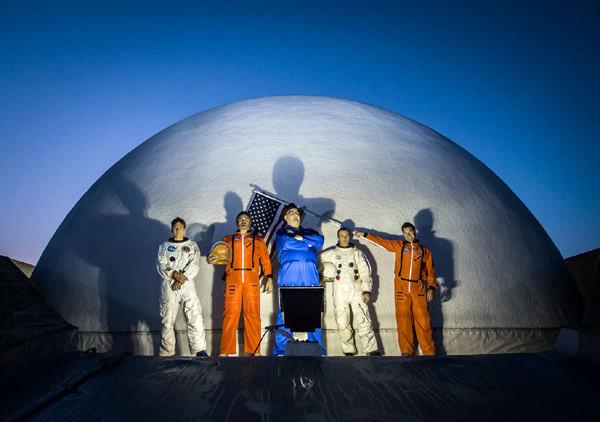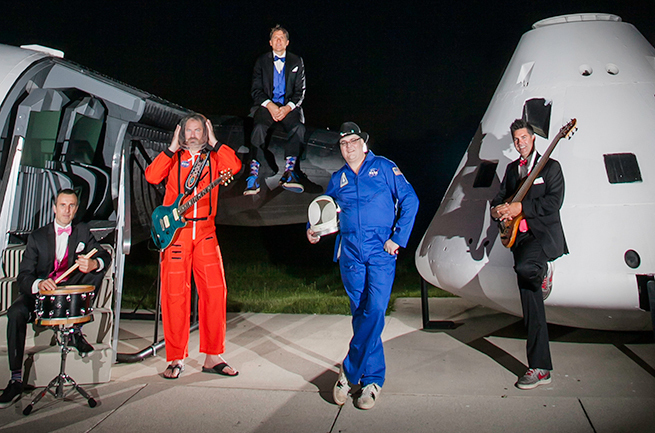Blues Traveler’s _Moon_ Explorations

The opening notes of the first track on Blues Traveler’s new album, Blow Up the Moon, swirl and spiral; psychedelic leaves tumbled by a freshening breeze. It’s an apropos analogy since the name of the song is “Hurricane.” A few seconds in, an instantly recognizable groove hits: a big, walloping, sideways waaoomp, like massive tectonic plates shifting. It jostles you for a moment, but you quickly regain your footing. There’s no doubt that you’re listening to Blues Traveler—familiar yet very different.
True Blues Traveler fans will tell you that 2015 marks 28 years since the band came together in a Princeton, N.J., garage. But if the band was born in 1987, then 1994 was the year that they came of age. That was the year of “Run-Around”—the single from the band’s aptly titled fourth album, four—and you could hear it blasting out of speakers everywhere.
The “La Bamba”-esque vibe of “Run-Around” was upbeat and infectious to the max, and the chorus invited draw-off-and- let-it-fly sing-alongs. But John Popper’s vocal delivery (machine-to-soul man in the blink of an eye) and his distinctive harmonica work were the keys to that breakthrough song.
“The challenge with playing a 10-holed instrument is trying not to repeat yourself—and it’s a bitch,” says Popper. No doubt it is—but he’s managed to do it for almost three decades. If you put an ear to Popper’s harp lines on “Run-Around,” then you’ll hear a bluesman’s furrowed-brow wail combined with the airy-yet-haunting voicing of a melodica and more. The comparisons to everyone from Jimi Hendrix to Augustus Pablo were inevitable.
There was an everyman feel to Blues Traveler, spiced with a dash of the eccentric. It was enough to make things interesting, but not enough to be intimidating. With Blues Traveler, the world had a band that was equally at home on Top 40 radio as it was headlining the H.O.R.D.E. tours of the ‘90s.
Flash-forward to 2014, 20 years after four was released. Blues Traveler had survived death (original bassist Bobby Sheehan succumbed to an overdose in 1999) and near-death (Popper suffered a near-fatal heart attack that same year); legal hassles brought on by Popper’s interest in firearms; and changes in the music market. With 11 studio albums and three live collections under their belts, Blues Traveler were a band with both a history and a future— except they weren’t quite sure what the next chapter of that future looked like.
The creation process for what turned into Blues Traveler’s new Blow Up the Moon album began last year, according to band co-founder and guitarist Chan Kinchla.
“We were talking about re-releasing four and making some kind of 20th- anniversary package out of it,” he says. “We wanted to add some new material and were looking for ideas.”

For Popper, those ideas existed outside the band itself. “For some reason, we got it into our heads a long time ago that it had to all be from our basement because we were a basement band; it had to come from our garage or it wasn’t genuine. It was like some misguided homage to The Beatles that we always did it all in-house. But even The Beatles had George Martin, you know? And they reached out to other people, as well.”
It was Popper’s involvement with his Duskray Troubadours side project in 2011 that introduced him to the world of collaborating. He worked with a number of songwriters and musicians, many of whom were longtime friends and mentors. “I could trust them,” says Popper. “And it was that trust that enabled me to open up and really enjoy it for what it should be.
“I took that energy back to the band and said, ‘Oh my God, collaborating’s great!’ They were skeptical at first, but I knew they would like it the second that they tried it.”
Blues Traveler first dipped their collective toes into collaborative waters on 2012’s Suzie Cracks the Whip album, when they worked with other songwriters, including Ron Sexsmith and their longtime friend, Spin Doctors’ Chris Barron. “It clicked with everybody,” says Popper. “The band saw the advantages in their own way and that’s when you’re really cooking as a band—when everybody can really come together around an idea, coming at it from their own specific direction.”
The decision to record bonus material for a proposed 20th-anniversary four release actually inspired Blues Traveler to take the collaborative process to the next level and totally out of their comfort zone.
Popper explains, “We began looking at musicians who were very different from us.” “We put the word out to a ton of people,” says Kinchla, “just expecting to do a couple collaborations. And all of a sudden, we had a lot of people getting back to us interested in doing it.”
One early session was with Illinois-based pop-punkers Plain White T’s, and the result is the audio equivalent of a Quentin Tarantino flick. In fact, the track, “Nikkia’s Prom,” is actually about a character who was just a four year old in Tarantino’s first Kill Bill movie.
“Remember the woman who Uma Thurman’s character kills early in the movie?” asks Popper. “The woman’s little daughter, Nikkia, is standing there when it happens and Uma Thurman says to her:
‘If you still feel raw about it, I’ll be waiting.’ So Tom [Higgenson] from the T’s and I tried to picture her growing up and what her prom would be like.” If the result is like an action-packed graphic novel, then Blues Traveler keyboardist Ben Wilson provides the track’s wild inks. “Ben’s a great color man,” says Popper.
Another seemingly unlikely pairing that instantly sparked musical magic early on was Blues Traveler’s sessions with Sean Foreman and Nathaniel Motte, better known to the electronica world as 3OH!3. When asked if combining the organic (guitar) with the electronic was a challenge, Kinchla responds: “No, not at all. In fact, it was a really simple process. We met up with Sean and Nat and had lunch. Nat had this groove he’d just whipped up; I was sitting next to him and plugged in a guitar, and we just started brainstorming. The thing is, he’s so quick with all his loops and stuff that it’s almost like he’s playing an instrument. It’s like you’re jamming. You’re playing with a musician.”
Incidentally, the new album’s title track features 3OH!3’s Foreman on ukulele. “I think he was digging us and it reminded him of sitting around the fire on a beach,” says Popper. “That’s Sean doing an impression of us. It works both ways.”
Kinchla says that the band had moved beyond the idea of doing a few bonus tracks. “We all agreed that we were having as much fun in the studio as we’d had since I can’t remember when. We were just gangbusters at that point, and it kind of organically turned into what it became. It wasn’t like we said, ‘Let’s make an album that’s all collaborations.’ It just turned into what it became instead of some big, daunting thing to begin with.”
The band’s schedule suddenly became a bit daunting between their usual heavy tour routing and their mounting list of offers to collaborate. “We basically flew all around the country in between gigs, trying to fit our schedules with all the kind musicians who’d opened up theirs,” Kinchla recalls. “We give our management all the credit in the world for coordinating it.”
The process began in February of last year and ran through the end of June, and the sit-downs with each artist lasted “three days, max,” says Popper. He has an interesting take on the band’s ability to jump into an unfamiliar genre and come out three days later with a finished piece of work—oftentimes more than one.
“We likened it to The Secret Life of Walter Mitty,” he says. “You know where Walter’s off to find ‘the elusive snow leopard?’ Each of these people was like a snow leopard and you wanted to capture
a moment with them. You didn’t have time to ponder the situation—you had to live in the moment.”
“We were getting out of our habits, our own ruts of how we did things, and we enjoyed it. We got a lot out of it,” Kinchla adds.
Two songs recorded with ska-punk band Dirty Heads were produced by Sublime’s Rome Ramirez, who also contributes vocals to one cut (“Vagabond Blues”). Both Popper and Kinchla describe the pairing as particularly comfortable and creative. “Everybody in both bands sat there and wrote those songs,” says Popper. “It’s really the way to go about it if everyone wants to participate. You play to your strengths because everyone knows what to contribute.”
But the session with teen rockers New Hollow that resulted in “Jackie’s Baby” got off to a slower start, according to Popper. “I’m sitting in a room with these kids who are 17 and 18. They’re not really saying much. I’m thinking, ‘You know, maybe they’ve heard a lot about me. Maybe I’m a little intimidating or something.’ I was trying to get the ball rolling, suggesting stuff; and they say, ‘How about, ‘Jackie’s baby gets home at 10:29.’’” They wanted this obscure time in there. And I’m thinking, ‘OK, then some sort of romance.’ And they say, ‘Why don’t we shoot her?’ And I said, ‘What?’ We got into a big argument. I’m too much of a gun nut, and my band will never let me shoot anybody in a song! Do you know how many times I’ve wanted to shoot somebody in a song? So I told the New Hollow guys: ‘I’ll tell you what. Maybe if you suggest it, they’ll go with it.’ So they did, and everybody else went: ‘Oh, I love it! It’s like ‘Maxwell’s Silver Hammer!’’”
Popper laughs. “It was the weirdest way to break the ice,” he says. But once they found some weird, creepy hook, they got into it and were excited about the idea. “All I know is, somebody gets shot and my prints are not on the gun.”
The song “Matador”—written and performed with country duo Thompson Square (Keifer and Shawna Thompson) as a tribute to Merle Haggard—packs a different kind of power.
“Shawna had the premise of that song and we all went with it,” says Popper. “One day, you’re the matador; the next day, you’re the bull. Let’s face it: We all kind of do want the bull to win, right? I mean, I’m on the cusp of turning into the bull myself.”
Popper laughs over one of his lyrical contributions to “Matador,” another song on the album: “Keifer said at one point, ‘Only John would put the word subversively in a country song.’”
The Blow Up the Moon sessions also included a lovely vocal duet with Jewel, a soulful pairing with Hanson, a rolling- down-the-highway team-up with Thomas Ian Nicholas, a couple of fast-paced rockers with Bowling For Soup, a lesson in masterful vocal harmonizing from *NSYNC’s JC Chasez (“The man knows his stuff,” says Popper) and some darkly textured introspection with Secondhand Serenade. By the time the run of eclectic sessions was over, Blues Traveler had a 14-track album that was like nothing they’d ever done before, and it still manages to sound like Blues Traveler.
John Popper has a theory about that: “There’s a shortcut to being an original- sounding musician—and that’s trying to rip people off. You end up doing a bad impression of the people you think you’re imitating and that bad impression is you. That’s who you are. By going in a hip-hop direction or trying a country sound—and all the different styles in-between—you wind up revealing yourself. You aren’t any of those things. You’re you appreciating that or getting immersed in it and that reveals—you.”



















